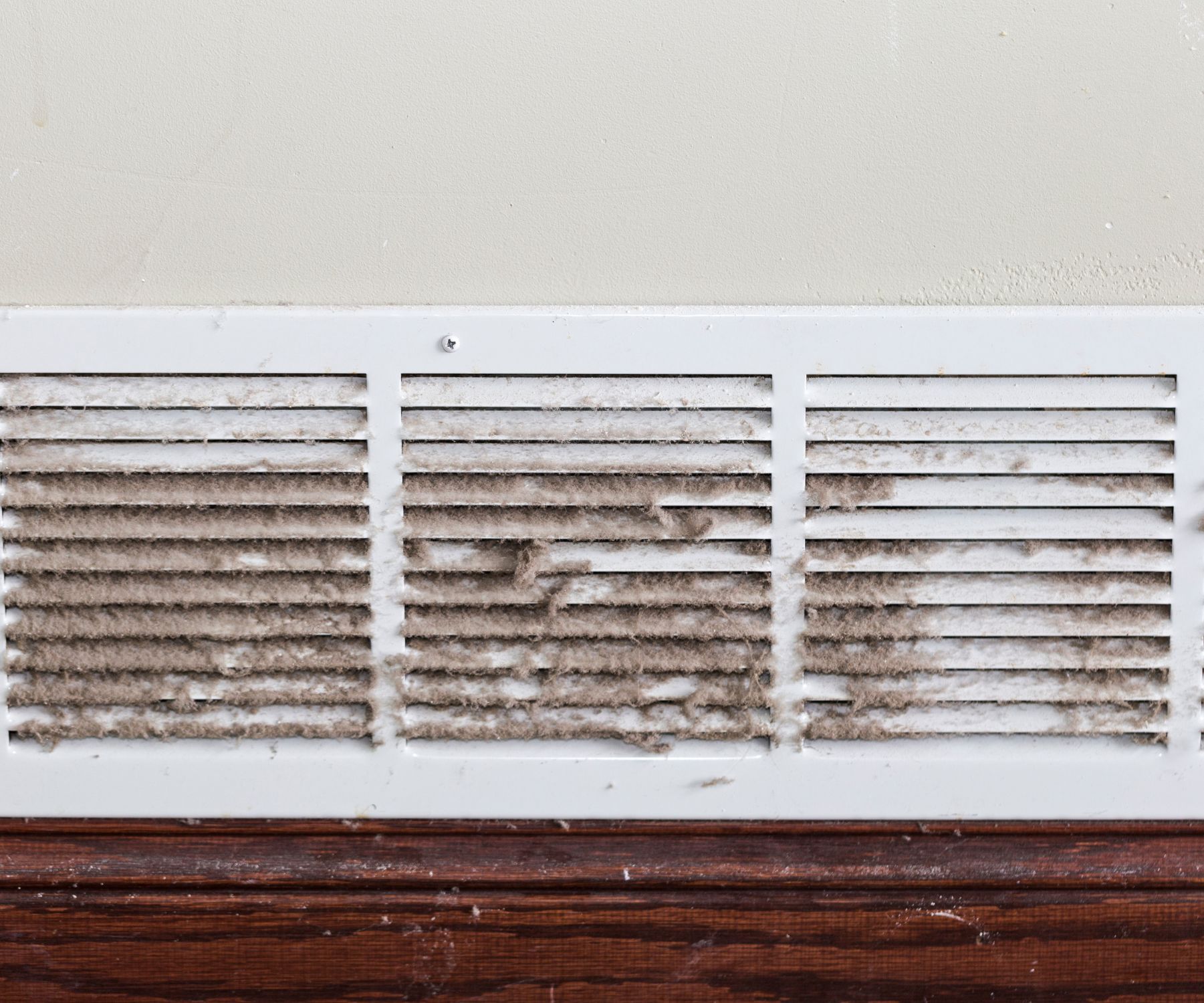Table of Contents
Why is My Central Heat Making Me Cough?
 If you find yourself coughing more often when the central heating is on, you’re not alone. Central heating can dry out the air and irritate respiratory passages, leading to coughing for some people. However, it’s not just the dry air that could be causing discomfort. Mold in HVAC systems can also contribute to respiratory issues, including coughing. Thankfully, there are steps you can take to mitigate these effects and keep your airways calm.
If you find yourself coughing more often when the central heating is on, you’re not alone. Central heating can dry out the air and irritate respiratory passages, leading to coughing for some people. However, it’s not just the dry air that could be causing discomfort. Mold in HVAC systems can also contribute to respiratory issues, including coughing. Thankfully, there are steps you can take to mitigate these effects and keep your airways calm.
Why Central Heating Causes Dry Air
Central heating works by warming air and distributing it throughout your home via vents and ducts. However, this heated air lacks moisture. As it circulates, the dry air evaporates moisture from surfaces like your skin, nasal passages, throat, and lungs, which can make tissues dry, irritated, and inflamed, triggering coughing.
Colder outdoor air holds less moisture than warm indoor air. So when you heat up cold outdoor air, its relative humidity drops dramatically. Central heating systems also lack a humidification component to add moisture back into the air.
 The Hidden Hazards of Dirty Ducts
The Hidden Hazards of Dirty Ducts
Dirty ducts can significantly compromise your indoor air quality and the efficiency of your HVAC system.
Accumulated dust, pollen, pet dander, and other pollutants in the ducts can circulate contaminated air throughout your home, exacerbating allergies, respiratory problems, and asthma symptoms. Moreover, this buildup can restrict airflow, forcing your system to work harder and leading to increased energy consumption and decreased system efficiency.2
Recognizing the signs of dirty ducts is key to maintaining a healthy indoor environment.
Indicators such as visible dust buildup around vents, unusual odors when the HVAC system is running, and an increase in respiratory issues or allergic reactions can signal the need for professional duct cleaning. Ensuring your ductwork is clean not only enhances air quality but also contributes to the overall efficiency and longevity of your HVAC system.1
Ventilation and Air Circulation
Before we delve into advanced air purification technologies like UV light solutions, it’s essential to understand the foundational role of ventilation and air circulation in maintaining indoor air quality. Proper ventilation is key to ensuring a healthy living environment, especially during the heating season when homes are sealed tight against the cold.
Why Ventilation Matters
Ventilation involves the exchange of indoor air with fresh outdoor air, which helps to reduce the accumulation of indoor air pollutants, including dust, allergens, and volatile organic compounds (VOCs). Good ventilation practices can also help mitigate the drying effect of central heating by introducing air with a higher moisture content from outside, particularly in areas with relatively humid outdoor climates.
Strategies for Improved Air Circulation
- Natural Ventilation: Simply opening windows and doors for short periods can significantly improve air quality, even in cold weather. This allows stale, dry air to escape and fresh, moist air to enter.
- Mechanical Ventilation: For homes in extreme climates or those with poor natural ventilation, mechanical systems such as Heat Recovery Ventilators (HRVs) or Energy Recovery Ventilators (ERVs) can provide controlled ventilation without significant heat loss.
- Ceiling and Exhaust Fans: Utilizing ceiling fans can help circulate heated air more evenly throughout your home, reducing hot and cold spots and improving comfort. Exhaust fans, especially in kitchens and bathrooms, are crucial for removing excess moisture and odors and preventing mold growth.
The Role of Air Circulation
In addition to bringing in fresh air, ensuring that the air inside your home moves effectively can prevent the accumulation of airborne pollutants. Air circulation can be enhanced with strategic use of fans, ensuring that air filters are clean and unobstructed, and making sure that furniture does not block air vents.
 Mold in HVAC Systems
Mold in HVAC Systems
In addition to drying out the air, central heating systems can harbor mold, which exacerbates respiratory issues. Mold thrives in moist environments, and when it grows in the ductwork or on other HVAC components, spores can spread throughout your home. Inhaling these spores can cause allergic reactions, exacerbate asthma, and provoke coughing.
Regular HVAC maintenance is crucial to prevent mold growth. This includes cleaning or replacing air filters, ensuring proper drainage, and inspecting ductwork for signs of moisture or mold. If mold is detected, professional cleaning may be necessary to remove it and prevent future growth.
Comparison of Indoor Air Quality Issues
| Issue | Cause | Effects on Health | Common Solutions |
|---|---|---|---|
| Dry Air | Central heating systems heating cold outdoor air | Dry and irritated respiratory passages, leading to coughing | Humidifiers, hydration stations, steamy showers |
| Mold | Moisture buildup in HVAC systems and ducts | Allergic reactions, asthma exacerbation, coughing | Regular HVAC maintenance, professional cleaning, UV light purifiers |
| Bacteria/Viruses | Circulation of contaminated air through HVAC systems | Respiratory infections, worsening of health conditions | UV light purifiers, improved filtration systems, regular cleaning |
Harnessing UV Light to Combat Mold in HVAC Systems
While addressing humidity and ensuring regular maintenance are critical steps in preventing mold growth in your HVAC system, another innovative solution is the use of Ultraviolet (UV) light technology. UV light, particularly in the UV-C spectrum, is known for its germicidal properties, effectively inactivating a wide range of microorganisms, including mold spores and bacteria.
How UV Light Works Against Mold
When installed within your HVAC system, UV lights work continuously to purify the air, targeting mold spores and bacteria before they have a chance to circulate throughout your home. The UV-C light disrupts the DNA of these microorganisms, preventing them from replicating and ultimately leading to their destruction. This not only helps to keep the ductwork clean but also improves the overall air quality in your home, reducing the potential triggers for coughs and other respiratory issues.
 Implementing UV Light Solutions among the leading solutions in this space is the REME HALO® by RGF, a whole-home in-duct air purifier that transcends traditional UV lamp capabilities.
Implementing UV Light Solutions among the leading solutions in this space is the REME HALO® by RGF, a whole-home in-duct air purifier that transcends traditional UV lamp capabilities.
Innovative Air Purification with REME HALO
The REME HALO® stands out with its unique approach to air purification, utilizing RGF’s proprietary technology to produce low levels of hydrogen peroxide in the air that circulates through your air-conditioning system. This proactive method effectively reduces airborne and surface bacteria, viruses, odors, and mold spores, enhancing the quality of the air you breathe. The device’s ability to replicate nature’s air purification process indoors makes it an exceptional addition to any HVAC system, aiming to create a healthier living environment. Click Here For More Info
REME HALO: A Step Further in Air Purification
For those particularly concerned about ozone emissions, the REME HALO offers a solution that is verified as Zero Ozone to the UL 2998 standard. Utilizing the advanced aGHP-Cell™ technology, this model introduces Gaseous Hydrogen Peroxide into the air, targeting pollutants at their source without contributing to indoor ozone levels. This ensures that the air purification process is both effective and environmentally friendly, meeting the strict emissions limits set by CARB certification.
Safety Considerations
It’s worth noting that direct exposure to UV-C light can be harmful to humans and pets, potentially causing skin and eye irritation. Therefore, UV lights should be installed in parts of the HVAC system that are not directly accessible during normal use to ensure safety.
FAQ on Central Heating and Indoor Air Quality
Q1: How does central heating affect indoor air quality?
A1: Central heating can reduce indoor humidity levels, leading to dry air which can irritate the respiratory system and skin. It may also circulate dust, allergens, and other pollutants if not properly maintained.
Q2: Why does my house feel so dry in the winter?
A2: In winter, the cold air outside holds less moisture than warm air. When this cold air is heated indoors without adding moisture, it leads to dry indoor conditions.
Q3: Can dry indoor air cause health issues?
A3: Yes, dry indoor air can lead to dry cough, irritated sinuses, itchy skin, and can exacerbate respiratory conditions such as asthma and allergies.3
Q4: How can I improve humidity levels in my home during the heating season?
A4: Using humidifiers, placing bowls of water around the house, and keeping indoor plants are effective ways to add moisture back into the air.
Q5: What are the signs of mold in HVAC systems?
A5: Musty odors, visible mold growth around vents and drip pans, and increased allergy symptoms can indicate mold presence in HVAC systems.
Q6: How can UV light purifiers help improve indoor air quality?
A6: UV light purifiers can kill or deactivate microorganisms like bacteria, viruses, and mold spores, reducing their presence in the air circulated by the HVAC system.
Q7: Is it necessary to have my ductwork cleaned regularly?
A7: Regular duct cleaning can help remove dust, debris, and potential mold growth, improving the efficiency of your HVAC system and the quality of indoor air.
Q8: Can ventilation help with indoor air quality during the heating season?
A8: Yes, proper ventilation can introduce fresh air and reduce pollutant levels indoors. Opening windows briefly or using ventilation systems can help.
Q9: What humidity level should I maintain indoors during winter?
A9: Indoor humidity levels between 30-50% are considered optimal for comfort and health during the winter months.
Q10: Should I see a professional if I suspect my HVAC system is affecting my health?
A10: Yes, if you experience persistent health issues like coughing, allergies, or asthma that you suspect are linked to your HVAC system, consult a professional for an inspection and potential solutions.


 Mold in HVAC Systems
Mold in HVAC Systems